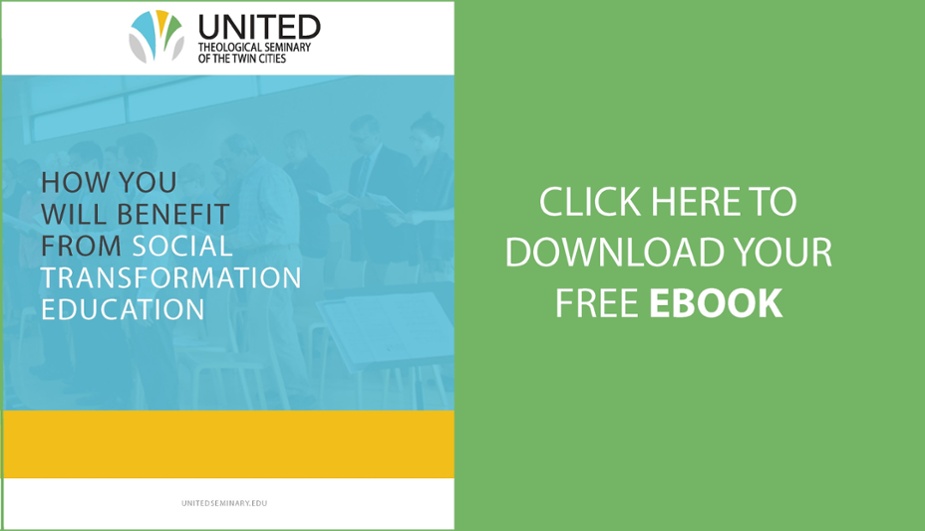This semester I am taking Interpretation as Resistance: Womanist, Feminist, and Queer Approaches to the Bible taught by Professors Alika Galloway and Carolyn Pressler. This week’s reading concerns the story of Abraham, Sarah, and Hagar. Sarah is unable to bear children, which is unfortunate since her husband Abraham is supposed to father “a great nation” (Gen. 12.2). Sarah comes up with a plan to have Abraham use a surrogate: her Egyptian slave Hagar. Abraham agrees, lays with Hagar, and Hagar conceives. The Bible then tells us that Hagar “saw that she had conceived [and] looked with contempt on her mistress”(Gen. 16.4). Sarah responds by being so cruel to Hagar that she runs away to the desert. Upon finding a spring of water, Hagar meets an angel of God who gives her an ambivalent message: go back and submit to a life of cruelty but also your son Ishmael will be the father of nations. A mixed bag, for sure.
The story transitions to Abraham being visited by three angels, who announce that Sarah will give birth to a son. Sarah, eavesdropping, laughs to herself at the thought of being able to give birth in her old age. But the joke’s on her, I guess, because she gives birth to Isaac or Yitzhaq, whose name means laughing. Haha! Oh, except, the story kind of takes some pretty dark turns. Time passes and Sarah sees Ishmael and Isaac playing, hears Ishmael’s laughter, and commands Abraham to exile Hagar and Ishmael into the wilderness. Even God talks to Abraham, backing up Sarah’s plan. Abraham acquiesces. Hagar and Ishmael travel through the desert with little food and water. Close to burying her own son, Hagar weeps and cries out: “Do not let me look on the death of the child!” God, hearing Ishmael's cries, talks once more to Hagar. God says:
“What troubles you, Hagar? Do not be afraid; for God has heard the voice of the boy where he is. Come, lift up the boy and hold him fast with your hand, for I will make a great nation of him.”
Then God makes a spring of water appear, Hagar and Ishmael are saved, and Ishmael grows to be a skilled archer and father of many sons. It’s a happy ending! Well, except that the next major story for the family is the Akedah, or binding of Isaac by his own father.
Now, it is always exciting when my academic work corresponds to what is going on in my religious world. Our examination of this story corresponds with the Jewish New Year, Rosh Hashana. On Rosh Hashana, it is traditional to read the story of Hagar’s exile and the binding of Isaac from the Torah. We read these stories of sending children to the brink of death right as we celebrate the change of seasons. As we make wishes for the future. As we dream of sweetness and good fortune. As we prepare to open up our bodies and souls for the ten days between now and Yom Kippur, the Day of Atonement. In this milieu we tackle Hagar and the Akedah.
Over the years, I have heard many sermons comparing Hagar’s wilderness to the days of awe between Rosh Hashana and Yom Kippur, days of uncertainty when we are being judged by God whether to be placed in the book of life or the book of death. But in 2017, amidst fires, earthquakes, hurricanes, threats of nuclear war, and fascists marching on the street, wilderness seems something different. More tangible. The wilderness is our normal. Or at least, we have normalized the wilderness. Or at least there is a danger of doing this.
The stories of Hagar in the wilderness and the binding of Isaac even show an evolution from discomfort at violence to accepting it. Earlier, we have Abraham actually arguing with God to save the cities of Sodom and Gomorrah. So, when Sarah asks Abraham to send Hagar and Ishmael away, “ The matter [is] very distressing to Abraham on account of his son.” (21.11). But by the time God asks Abraham to sacrifice Isaac, Abraham goes without complaint, without talking back. On one hand, it is possible to see how Abraham might be afraid to argue because he has seen cities destroyed and his family torn apart by God. On the other hand, I wonder if Abraham goes willingly to kill his son, because he has seen the power of willingness to sacrifice those you supposedly love, for is not God all powerful? And has God not demonstrated His power through spectacles of violence and force? Does Abraham go along, because-- to be good, to be devoted, to be holy, to be a father like The Father-- he must be willing and able to kill? After all, Abraham was willing to put both Sarah and Hagar in danger at different points, willing to use them to fulfil his name. Is it so far a stretch to see how he might be willing to shed life after being taught to abuse it?
This is a dangerous story for me. And a particularly potent depiction of patriarchal violence. It becomes second nature for Abraham to allow pain to shape him and in turn to cause pain. His role as a forefather seems contingent on rites of violence.
Nationalism, xenophobia and hatred of immigrants, racism, obstructing health care, and denying rights to LGBTQ people come from the same impulse as Abraham’s to accept the cycle as long as the father is still in his place. To be a patriarch, is to perpetuate everyone else’s suffering.
But the story we tell on Rosh Hashana is also the story of Hagar--she is not just a prop in Abraham’s tale. It is by her example that I believe the Bible sets up a potential critique of the forefather. For unlike Abraham, Hagar voices her pain. She weeps. She excises her suffering in an exclamation to God: “Do not let me look on the death of the child” (21.16). She speaks her pain, locates God as a player in her suffering and commands Him to take responsibility for her and Ishmael. Hagar has spoken to God before, and her relationship with God is different from Abraham’s. After God told the then pregnant Hagar to go back to her suffering, she asks “Have I really seen God and remained alive after seeing him?” There is in her exclamation profound ambivalence to God. She recognize a danger in God and a disbelief in surviving Him. But from that space between trust and doubt, in that semi-acceptance of her lot, she lives. She eventually thrives. And she is able to address God as an agent in her own right. Not just the passive receptacle of God’s command, but someone who has seen the beauty and the terror of the divine, and spoken it. She has addressed her pain, not hidden it or perpetuated it through others, but reflected it back onto its source.
When I first heard Leonard Cohen’s song “You Know Who I Am” from Songs from a Room, I thought the lyrics were in God’s perspective to someone, probably Abraham-- based on the other songs from the album. God describes Himself requiring incredible asks:
But God is also the revealer of remarkable truths and healing.
As I reflect on the particular understanding that Hagar has of God, I wonder if she is a more fitting “you” for the song to be addressing:
I imagine Hagar in the desert staring at the sun, which gives life, but in that moment most assuredly also implies death. And she knows God and speaks to God and dialogues with the deadly and life-giving God, even as He plays a more sinister character in Abraham’s adjacent story. To speak to power is to know power and in turn to know yourself, to know your own pain and investigate it. To know God is to know what and who you are and to use your voice. Abraham once cried out. He once argued with God to save lives, but in becoming the de facto patriarch, his ability to speak to God turned to being able only to listen to God and then, after the Akedah, to silence.
As we move into another year, deeper into the wilderness, I hope that I, that we as individuals, as a country, as a world can look at our pains and name them instead of simply passing it onto others. I hope that I will be held accountable for the pain I cause, just as I vow--through my art and through my academics--to hold accountable the structures that perpetuate my own pain. And in doing this, in speaking to power, in reaching to God, talking to God, loving and fearing and wondering about and speaking to God, I hope for a year of sweetnesses that do not perpetuate the suffering of others and that indicate the potential for liberation. Shana Tova Umetuka!
Max Brumberg-Kraus is originally from Providence, RI, but moved to the midwest to attend Beloit College, WI as an undergrad. There, he majored in Theatre Performance and Classical Civilizations with a minor in Critical Identity Studies, and was the Artistic Director of Beloit Independent Theatre Experience (BITE). He moved to St. Paul in July 2016, where he continues to pursue his artistic goals as a performer, playwright, and poet. Max is the Digital Content Specialist at United, where he is also pursuing an MA with a concentration in Theology and the Arts.




Your Comments :